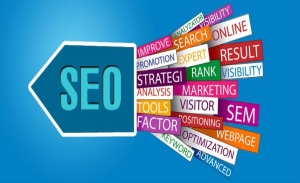 Take into account the Search Engine optimization for the Web search engine positioning comes to implement a content manager can keep our investment in content is devalued by a poor presence in the search engines.
Take into account the Search Engine optimization for the Web search engine positioning comes to implement a content manager can keep our investment in content is devalued by a poor presence in the search engines.
The managers of content
The generation, publication and file a huge number of pages in the major portals and Web sites poses many challenges that the management systems of web content (or CMS, Content Management System) Have tried to solve in recent years: Read more
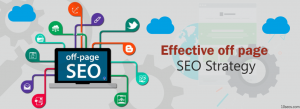 If there is only one word to describe the entire off page optimization strategy, it would be backlinks. Nowadays, backlinks are the biggest factor that affect your site’s capability to rank in search engine listings.
If there is only one word to describe the entire off page optimization strategy, it would be backlinks. Nowadays, backlinks are the biggest factor that affect your site’s capability to rank in search engine listings.
I’ve seen blog pages that rank on top of the result page without much content but a lot of inbound links. The fact is when many other sites vote for the topical relevance of a particular page, those votes have more weight than any on-page factors combined.
Sure, on-page optimization is still important. A page about rose gardening should contain the keyword at least once. That is just natural, except the page is a video page, of which you still can include a few lines or paragraphs of description in it containing the keyword.
Why Off-Page Optimization is Given Such a Weight
It’s simple. Webmasters and bloggers have less control over off-page optimization. While there are ways to gain a lot of inbound links, it is almost impossible to get links from some blogs unless the bloggers also see your pages as relevant to what they have to offer to their readers.
Of course, not all inbound links have the same weight too. A backlink from authority blog in the niche will boost your ranking and transfer authority to your page and site more than 100s of average or low authority blog pages.
That means you can’t just randomly get links from many blogs or sites around the Internet and hope to propel your ranking to the top. While certainly the number of inbound links to your site can make a difference, there are more factors to consider.
PageRank used to be a big factor that determines the authority of a page. While at the moment a lot of people would disagree, still it says something about the page.
Inbound Link Attributes
If a link is not the same as others, which counts more than the other? The following is the list of inbound link attributes. They are listed in no particular order. In fact, no one can be sure exactly which attribute has more significant value than others.
However, based on various experiments, one can determine if certain attribute matters to page rankings.
Anchor Text of the Backlink
This could be the biggest factor because it allows search engines to determine the relevance of the linked page to the keyword in the anchor text. For those who haven’t know yet, anchor text is the underlined text in a link.
If a link says rose gardening tips, the linked page may be of relevance to rose gardening or rose gardening tips.
Text Surrounding the Link
Anchor text is important, but analyzing the text surrounding the link can also help because not everyone links to a page using the exact keyword. Some bloggers tend to use one or two words, or sometimes the more generic “click here” anchor text.
This may not be as powerful as anchor text, but still a factor. It probably will become more important in the future.
The Number of Links from Various Sites
If enough sites link to your site page with the same anchor text, such as rose gardening tips, it is hard to judge otherwise. Your page must have to do with the topic in the anchor text.
Again, volume counts, but there are more factors to that than just merely numbers.
Topical Relevance of Linking Page
A linking page has to be at least topically relevant to the linked page. That just makes sense. A page about robotic will less likely link to rose gardening pages, unless of course, the page is about a robot that is able to take care of the garden for you.
That doesn’t mean you have to get backlinks only from a site similar to yours. There are sites that are the authority in almost all topics such as article directories and newspaper sites.
Moreover, some SEO experts think topical relevance is not an exact thing. For instance, a link from lifestyle web site to a page about rose gardening tips still holds some relevance.
Authority of the Linking Site
Obviously the higher the authority of the linking site, the more significant the power of links from the page can be. One high authority link can be as powerful as tens or even hundreds of backlinks from average or low quality pages.
The anchor text help determine topic, while the link popularity or authority of the link specify the amount of influence.
Authority of the Site in the Niche
Getting random links from other sites may help, but if none of the links are from sites in the same community, it can be hard to rank within that niche.
The more authority a site has, globally and within the topical community, the more important its link is to the other pages or sites in the same niche.
Again, thematically related sites may still be an obscure thing but generally speaking as the theme of the linking and linked pages and sites becomes more similar, the influence may also heighten.
Age of the Link
Obviously the longer the links stay there, the better. That means the pages are there to stay, instead of just dynamic contents that change over time.
Internal Link Popularity of the Linking Page
If the internal page that links to the page has high authority, it also transfers it to the linked page.
Using the right anchor text and channeling the links properly to the right pages can help search engine rankings tremendously.
TLD of the Linking Domain
Domains with .edu and .gov are move valuable because they often have a lot of trusted links pointed to their pages. That makes the sites to have high authority.
Getting links from such domains is a way to boost authority, because it has better influence than a lot of average links from new sites or new blog comments.
Conclusion
Not all links are created the same. While in theory inbound links are used because they are more natural than off-page optimization factors, they are not prone to manipulation.
However, quality of contents still help when it comes to the distribution and viral effect of the contents, which usually means more inbound links to the contents.
Combining both good quality content and inbound links is the key to rank for any keyword in the search engines. Theoretically, if you can surpass the amount and quality of inbound links of a top ranking site, you are able to replace the ranking.
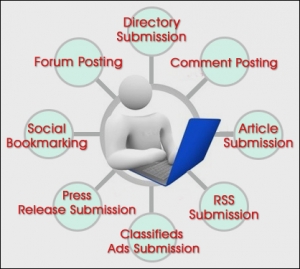 Successful Off page Optimization Campaign
Successful Off page Optimization Campaign
Ever wondered how link building consultants and companies index client’s websites in major search engines so quickly?
Well, based on research, link building experts learned that SEO is all about “off page optimization”
and the key to a successful off page optimization campaign is the proper utilization of inbound text links to a website.
Deep Link Building Services to Increase Page Rank
By increasing the inbound text links of all the pages of the website you can increase the PageRank (PR) and links as well. Google PageRank does not apply to the website as a whole but to each individual page, that’s why you need all websites to have deep online link building carried out in order to increase each individual page’s Page Rank and its overall importance. Each page on your website would be targeting different keywords and each page would require a linking campaign so that it can generate traffic and a return on investment.
Drive Potential Customers to Your Site
To push your site towards the top of search engine result pages, it’s important to have many web sites link to your site. Incoming links (also known as inbound links and non-reciprocal links) have gained unprecedented importance in high ranking of your website. All major search engines, including Google, Yahoo, MSN, rely on this off-page factor i.e. Link building to determine how important your site and rank it high accordingly. On page optimization is not enough to get you good rankings. A sufficient number of good incoming links helps your website beat the competition to rank high in search engine results.
In addition, text link ads also provide ways for customers to reach your website: to click and navigate to your site. Text links boosts your search engine position, thus driving potential customers to your site.
Off page Optimization Tips for Getting Top 10 Ranking in Google
1. Web Directory Submission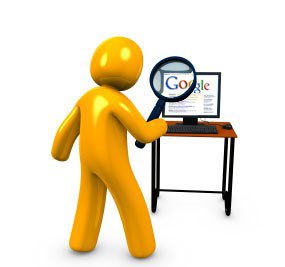
2. Blog Directory Submission
3. Article Submission
4. Video Submission
5. Classifieds Submission
6. Blog Commenting
7. Forum Posting
8. Image Submission
9. Press Release
10. Social Bookmarking
11. B2B Submission
12. RSS Directory Submission
13. Search Engine Submission
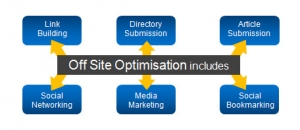 Everyone, at one point in time has looked up certain keywords and key phrases on Google web pages and a few other distinguished search engines. Ever wondered how these pages earn top search engine ranking or even understand from a single keyword or key phrase what it needs to look for?
Everyone, at one point in time has looked up certain keywords and key phrases on Google web pages and a few other distinguished search engines. Ever wondered how these pages earn top search engine ranking or even understand from a single keyword or key phrase what it needs to look for?
This important process of Google ranking system and looking up webpage’s according to keywords and key phrases entered is called On-page SEO. Basic SEO strategies involve the on-page optimization process where every individual web page elements are structured and established. This helps search engines like Google, rank and lookup pages according to the keyword or key phrase entered by the user. These simple SEO techniques allows search engine know of every content there is on a webpage.
Search Optimization Strategy
The process of SEO strategy and Google ranking, which when done right helps increase website traffic involves 6 different on-page optimization components. Most search engine optimization companies are aware of these components. These SEO strategies are used to increase the visibility of web pages in search engines, which also gives rise to the Google rank system. Generally the search engines follow a certain algorithm to look up webpage’s according to the keyword or key phrase entered, and these algorithms have remained constant. Unless these change, the general components needed for internet marketing SEO will continue to remain the same.
Title Tags
Or simply known as content title, it is the most important content in search engine optimization SEO. An ideal content title should be around 60-70 characters, beginning with the main key phrase while the end should hold the branded element. It is important to add unique titles to your content, as it acts as a juicy bite into what the content holds, but should also be different from other similar content on the internet. Unique content will also bring in clicks from your target niche rather than sharing it with your competitors with similar titles.
Meta Tag Optimization
For some, understanding this component could be a bit complicated. However in simple terms, meta tags are nothing but mediators that hold information about your web page and delivers it to every search engine there is. When search engines look up your webpage (also known as crawling) for mini themes, they are in fact coded to look for details on the kind of information your web page holds. Without a meta tag, the search engine will fail to recognize the core of your web page. Meta tag descriptions should therefore be comprehensive which will in turn help search engines understand your page. This is again organic SEO that helps in increasing your web traffic, provided these meta tags are detailed.
On-Page Headings
SEO techniques followed by most companies are simple, they are not interested in mumbo jumbo and web pages that are full of mixed content with no apparent theme to it. What Search engine optimization companies prefer is simple webpage’s that talk about a singular topic, which again forms the main heading of the web page. We are already aware that every body of content and text requires a header that is appropriately highlighted. A short and sweet header that gives enough insight into the material of your webpage should be held within the ‘h1 tag’, which is nothing but syntax needed to code content into webpage’s. The importance of these tags is stupendous, since this is what search engines love looking at. Another criterion of a well highlighted heading is that it should be higher than the body or even introduction of your web page text, but within the web page ‘h1 tag’. Search engine crawlers find it easier accessing your text headers if done so, hence make sure that it also contains the main keyword.
Page Copy
This component is the prime reason for increase in website traffic. Understanding and utilizing this on-page SEO optimization will also earn your website a high Google web page rank. Web site traffic and search engine crawlers are hungry for content and information on the internet. A page copy that is rich in primary as well as secondary keywords and key phrases, along with being unique and informative will earn any web page good visibility irrespective of the search engine. The idea is to create content that is not just tantalizing but has the right mix of richly texted keywords. Although HTML is preferred for search engine optimization, page copy can be news releases, blogs, user generated content and even articles. Adding related videos and images adds to the experience and worthiness of the content.
An ideal page copy would have your primary keywords and key phrases dispersed liberally in the introductory part of your content (which is in the beginning). This allows search engines to decipher the theme/topic that the rest of your web page contains. Again, it is vital that content is unique and not a copy from your competitors website, this will only drain its purpose and that is to increase website traffic.
Search engine optimized SEO pages generally carry a minimum of 150-200 words in a page. If you want your webpage to do even better then settle for 400-600 words per page. The number of words incorporated in your webpage is important as well since it determines your keyword density which in turn also gives appropriate information about your page to every search engine there is.
Page URLs
Until recent times, not much importance was given to a page URL. Now it has become increasingly necessary for URL’s that are search engine friendly which is the best component in on-page SEO optimization. A good SEO strategy in this case would be that you keep your ULR relevant to your content, easy enough for even a novice to remember and as short as possible. A URL with the least dynamic parameters will work wonders towards increasing website traffic. If given a chance to re-write your URL make sure to clean it up as much as possible. Search engines are known to index dynamic URL strings, and at the same time a short enough but descriptive URL will work well with every user.
Anchor Text
The internet would be redundant if there were no links between webpage’s, websites and lots more. If you want your SEO techniques to succeed and at the same time increase web traffic to your webpage, make sure there are enough of rich keyword anchor text that will interlink your site pages. Search engine algorithms use anchor texts to determine Inbound Linking Quality of links on any given page. Obviously this is an important key that helps in Google ranks and other search engine ranks. As mentioned if your webpage enjoys a good set of interlinks you automatically increase website traffic to your webpage. With good number of quality interlinks, internet surfers are automatically directed to your webpage’s and this in turn increases the webpage’s ranks on Google or any other search engine you are familiar with. With dynamic interlinks users can reach parts of your website and make a note of the information they were interested in.
